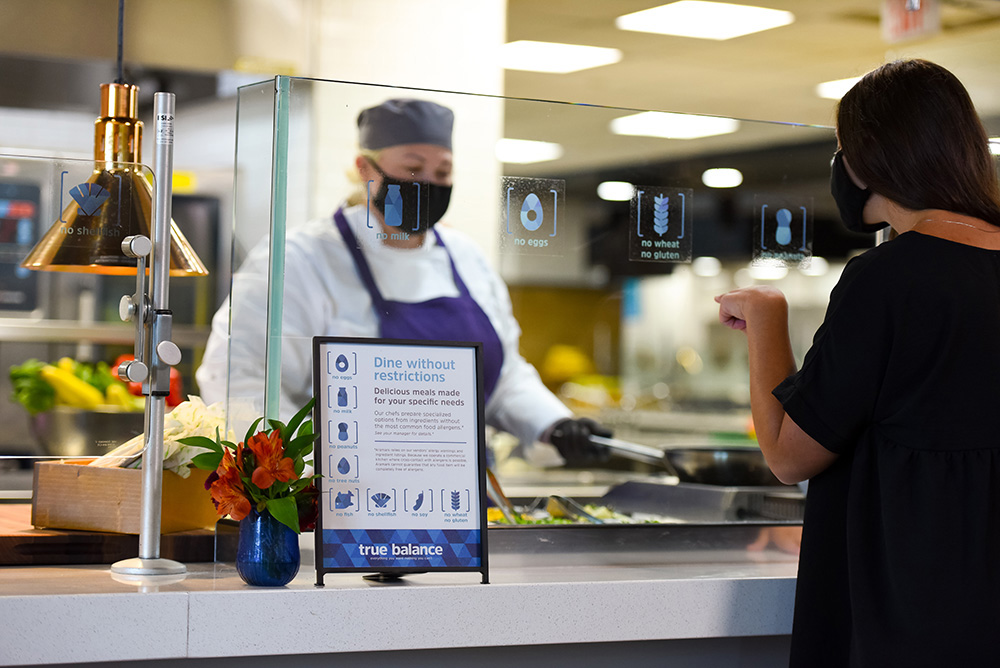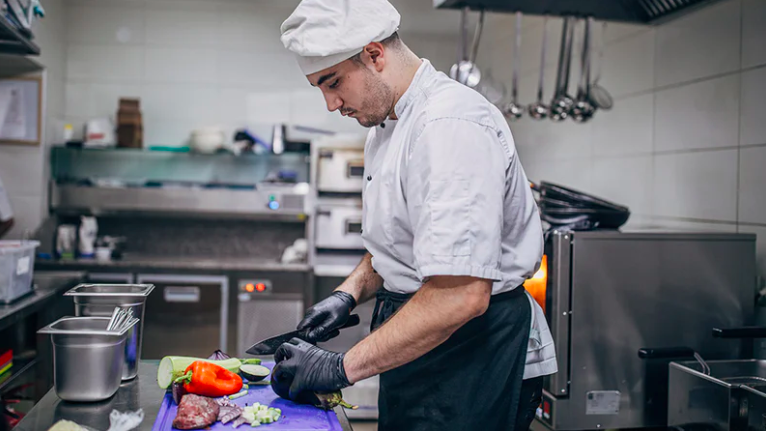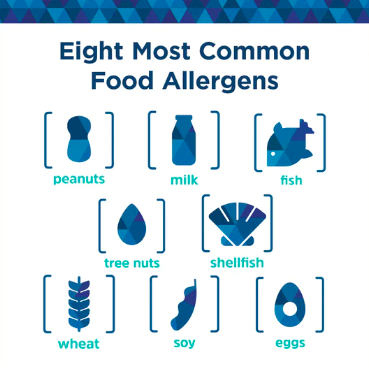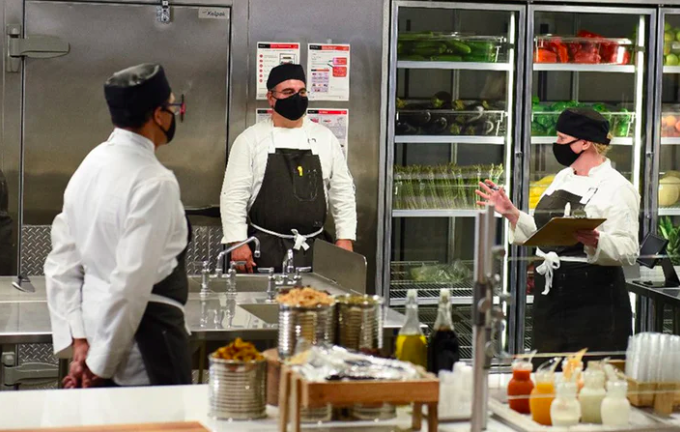Article taken from Press Team at Aramark‘s Health and Wellness Blog
For the estimated 32 million Americans with food allergies, dining out is an implicit act of trust. The only way to prevent an allergic reaction is to avoid the food in question, which means guests must read menus carefully, double-check ingredient labels, and ask detailed questions to know what is (and isn’t) in their meal.

We recognize our role in this equation, as a provider of several allergen-friendly dining concepts featuring food prepared without the most common allergens, plus gluten. As Lara Malatesta, VP, Food Safety and Management Systems, says: “To be a trusted hospitality partner, we must offer and serve food that is safe for our guests with food allergies.”

This statement is especially true in the higher education setting, as teenagers and young adults with food allergies are at higher risk. College is often the first time students must manage their food allergies independently. For this reason, a robust allergen-friendly dining program can be a differentiator for families choosing where to send their children to school.
Safety is the ultimate demonstration of how we care about our people’s health and well-being. To this end, we have accelerated our food allergy awareness, training, and auditing processes to safely deliver allergen-friendly menus to our guests who need them.
Controlling What We Can
Food allergy safety relies upon integrity at every stage of food production and preparation. From processing to plating, we must take care to avoid cross-contact with the top eight allergens: eggs, milk, peanuts, tree nuts, fish, shellfish, soy, and wheat. (Our allergen solutions also control for gluten and will incorporate a ninth top allergen, sesame, starting in 2023.)
“From the second food comes in the receiving dock to the second a consumer takes their first bite, there isn’t a moment where food allergens cannot become an issue,” states Senior Food Safety Specialist Brandon Mathias.
New federal food labeling legislation and state training mandates — coupled with pandemic-related labor shortages, supply chain disruptions, and product substitutions — heightened our industry’s need to mitigate food-related allergic events. While it’s impossible to eliminate all risks for people with food allergies, we can work to ensure our frontline employees are both educated about these risks and trained in safety best practices.
“We want to be there for our guests with food allergies in any way we can,” says Malatesta, who understands firsthand the everyday challenge of eating allergen-friendly food. “By providing the right people with the right training, we can turn our managers and associates into food allergy advocates.”
A Suite of Solutions
We continue to develop and deploy new ways to strengthen allergen awareness and management in our kitchens. Our approach is designed to give our people the information and tools they need to deliver safe food while also affirming that our allergen solutions stations — True Balance®, Clean Plate, and allgood — meet the highest industry standards.

Together, the top eight food allergens account for about 90% of allergic reactions.
Providing access to continuous learning opportunities has been critical to our success. In 2021, we became the largest food service provider to host and assign accredited third-party food allergy safety training for our managers and associates. The MenuTrinfo® ANSI-accredited AllerTrain® course is required for all managers at our True Balance, Clean Plate, and allgood stations. We have also enabled free access to all managers and associates working with any client or line of business in the U.S.
The food allergy safety training suite from MenuTrinfo® also includes AllerTrain® Lite, which any Aramark associate can take via an online learning management system (LMS), and the Certified AllerTrainer™ (CAT) program, a “train the trainer” course that prepares managers to provide live, accredited food allergy safety training to any group of employees. To date, about 70 managers have become CATs and nearly 1,700 frontline team members have passed the AllerTrain® certification, which is valid for five years.

“With AllerTrain® certification, people demonstrate a high level of competency in understanding how serious and life-threatening a food allergy can be, and how to prepare allergen- and gluten-friendly food,” says Mathias, who has led our recent food allergy safety initiatives company-wide.
To validate the integrity of our allergen-friendly dining programs, we have also deployed AllerCheck™, a first-of-its-kind food allergen audit offered by MenuTrinfo® and conducted by Steritech®. This audit process is required for allergen solution stations and ensures that all True Balance, Clean Plate, and allgood stations consistently meet operating standards and follow industry best practices for producing and preparing allergen-friendly food. To date, almost every allergen solutions station in Aramarks Collegiate Hospitality has been audited through AllerCheck™, a process they’ll undergo once per semester.
Demand has been high for the voluntary food allergy safety training and other learning opportunities. To keep the topic top-of-mind, Mathias hosts routine allergen learning calls with our registered dietitians working at colleges and universities. In May, our collective efforts earned us three of MenuTrinfo® Annual Allergy Awards, which recognize dedication to the safety of diners with food allergies, plus innovative change in the industry: Mathias for Best Food Allergy Champion; Gillian Kelly, RDN, Health and Wellness Manager with James Madison University Dining Services for Best Food Allergy Training for Universities; and Aramark for Best Overall Food Allergy Program for Universities.
“It is humbling and inspiring, and a reminder our work matters and we’re on the right track. I cannot express enough thanks and gratefulness for the incredible mentors, supporters, teammates, and friends that got us here as a team and company,” Mathias shares.
Handled With Care
When a guest tells us they have a food allergy, we want to empower our managers and associates to ask the right questions and seek the right answers. Creating a culture of safety comes down to these everyday habits and decisions, which is why we have reinforced our commitment to food allergy safety throughout our operations, not just with our allergen solutions. In the future, we’ll look to provide even easier access to training, tools, and enablers at the moment our teams want or need them — so, in turn, our guests have a reliable resource for all of their food safety and allergen questions. Next up, our leadership has committed to training all frontline managers working across our Student Nutrition accounts in the U.S.

“By providing the right people with the right training, we can turn our managers and associates into food allergy advocates.”
– Lara Malatesta Vice President, Food Safety and Management Systems
“There’s a lot of muscle memory now when it comes to practicing food allergy safety,” says Malatesta.
For our guests with food allergies, that means we’re not only keeping them safe, but giving them a good dining experience — the very essence of hospitality. “Any request someone with a food allergy makes is an ask for help for their safety and inclusion,” Mathias points out. “My commitment is to do everything I can to ensure our guests can bring their whole selves to every dining experience and go home the same way they came in.”



